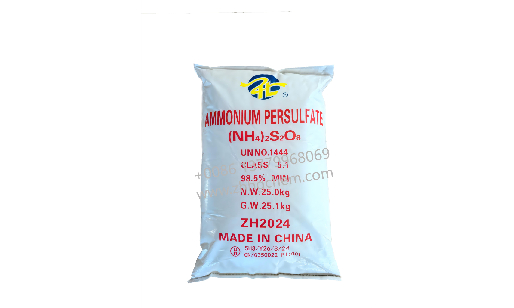In chemical production, Ammonium Persulfate, as a commonly used initiator, is widely applied in fields such as high-molecular materials, coatings, and adhesives. As a strong oxidizing agent, Ammonium Persulfate can decompose in water to generate sulfate radicals (SO4•-), which are highly reactive and can rapidly initiate the monomer polymerization reaction. However, the dosage of Ammonium Persulfate as an initiator is not fixed but needs to be precisely regulated according to the specific reaction system and the characteristics of the target product. A reasonable dosage can not only improve the reaction efficiency but also optimize the properties of the product and reduce production costs.

The dosage of Ammonium Persulfate is mainly affected by factors such as the type of reaction system, the characteristics of the target product, and the selection of reaction conditions. Different polymerization reactions have quite different requirements for the initiator. For example, in the free radical polymerization of water-soluble monomers, the dosage of Ammonium Persulfate is usually low; while in polymerization reactions carried out in non-polar solvents, due to the limited diffusion of radicals, a higher dosage may be required. In addition, the viscosity of the reaction system also affects the dispersion effect of the initiator. High-viscosity systems usually need more Ammonium Persulfate to ensure the initiation efficiency.
The characteristics of the target product are also important factors influencing the dosage of Ammonium Persulfate. The dosage of Ammonium Persulfate has a significant impact on the molecular weight and distribution of the polymerization product. A lower dosage often results in polymers with high molecular weights, but the reaction rate is slower; while a higher dosage can accelerate the reaction rate, but it may lead to a broader molecular weight distribution of the product, and even branching or cross-linking phenomena may occur. Therefore, in production practice, it is necessary to adjust the dosage of Ammonium Persulfate reasonably according to the performance requirements of the target product.
The selection of reaction conditions cannot be ignored either. Factors such as reaction temperature, pH value, and reaction time will all affect the decomposition rate and initiation efficiency of Ammonium Persulfate. Under alkaline conditions, the decomposition rate of Ammonium Persulfate accelerates, so in base-catalyzed reactions, its dosage can be appropriately reduced; while under acidic conditions, the decomposition rate is slower, and a higher dosage may be required. Moreover, a long reaction period usually requires a higher initial initiator dosage to compensate for the consumption of the initiator.
Fujian Zhanhua Chemical, as a high-tech enterprise specializing in the production and operation of persulfate series products, has accumulated rich experience in the application of Ammonium Persulfate. Taking its application in aqueous emulsion polymerization as an example, Fujian Zhanhua Chemical has successfully achieved precise control of the particle size of the emulsion by optimizing the dosage of Ammonium Persulfate. In a certain case, technicians found that appropriately reducing the dosage of Ammonium Persulfate can not only reduce the solid content of the emulsion but also significantly improve its stability and coating properties. This achievement has not only enhanced the market competitiveness of the product but also provided downstream customers with higher-quality water-based coating solutions.
In addition, Fujian Zhanhua Chemical also focuses on continuous technological innovation. Through close cooperation with customers, the company can provide personalized technical support according to the needs of different application scenarios. Whether it is optimizing traditional polymerization processes or meeting the challenges in emerging material fields, Fujian Zhanhua Chemical can create greater value for customers with its professional team and advanced technology.
The dosage of Ammonium Persulfate as an initiator is an important parameter in chemical production. Its reasonable regulation can not only improve reaction efficiency and product quality but also strongly support enterprises in cost control and market competitiveness. The practical experience of Fujian Zhanhua Chemical shows that in chemical production, precise control of details can often bring remarkable results. This is not only an optimization of the technological process but also a strong impetus for the high-quality development of the entire industry. By thoroughly understanding the characteristics of Ammonium Persulfate and its applications in different reaction systems, we can better address the challenges in chemical production and inject new impetus into the technological innovation and sustainable development of the industry.